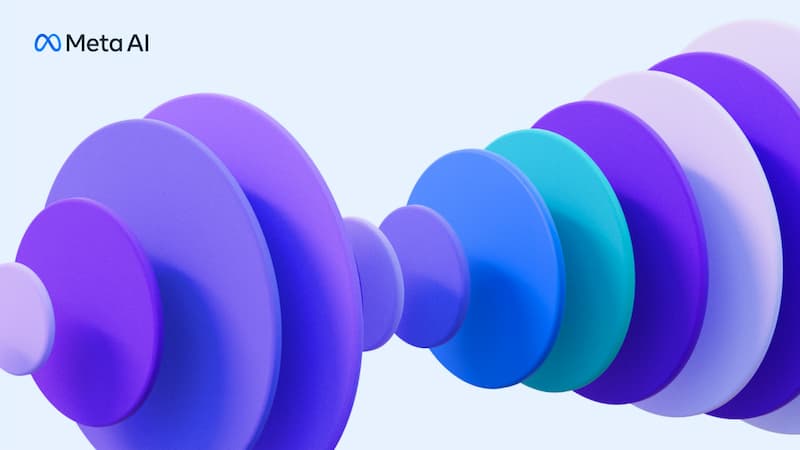Generative AI has made impressive strides in recent years, with models capable of generating coherent images, video, and text from simple text prompts. However, high-fidelity audio generation has lagged behind other modalities due to the complexity of modelling audio signals and patterns.
Meta's new AudioCraft framework promises to change that by providing an accessible toolkit for generating music, sounds, and speech.

AudioCraft, a cutting-edge technology that translates text-based inputs into realistic audio and music, is set to revolutionize various fields such as music, game development, and small business marketing.
By providing a more accessible platform for audio generation and opening new avenues for creativity, it fosters innovation, democratizes audio design, and emphasizes the importance of responsible, open-source development.
Samples Courtesy Meta
Text Prompt: Earthy tones, environmentally conscious, ukulele-infused, harmonic, breezy, easygoing, organic instrumentation, gentle grooves
Text Prompt: Pop dance track with catchy melodies, tropical percussions, and upbeat rhythms, perfect for the beach
Text Prompt: Sirens and a humming engine approach and pass
Text Prompt: Whistling with wind blowing

AI Audio Generation
The Promise of AudioCraft
AudioCraft harnesses the power of three models: MusicGen, AudioGen, and EnCodec. Together, they produce high-quality, realistic audio and music, allowing professionals across various fields to generate sound effects, music, and environmental noise effortlessly.
From Text to Audio: The Mechanics of AudioCraft
The Components of AudioCraft
1. MusicGen: Tailored for music generation, trained with specifically licensed music.
2. AudioGen: For environmental sounds and sound effects, trained on public sound effects.
3. EnCodec: Enhances the quality of music generation, compressing and reconstructing audio signals.
Simplifying State-of-the-Art Audio Generation
AudioCraft utilizes a novel tokenization approach to break down raw audio waveforms into discrete tokens using the lossy EnCodec neural audio codec. This allows autoregressive language models to be trained on the tokens, recursively generating new combinations to synthesize novel audio samples.
The team simplified model architectures compared to prior work, yet achieved state-of-the-art results by cleverly interleaving multiple token streams to capture long-range dependencies critical for high-fidelity audio.
How AudioCraft Works
Using a natural interface, AudioCraft simplifies the complex process of generating audio. It makes use of discrete audio tokens from raw signals to form a vocabulary for music samples. Trained through an elegant token interleaving pattern, the models efficiently capture long-term dependencies, allowing the creation of high-fidelity sounds.
The Impact on Various Fields
Musicians and Composers
Professional musicians can explore new compositions without playing a single note, fostering creativity, and providing inspiration.
Game Developers
Indie game developers can populate virtual worlds with sound effects on a limited budget, enhancing the immersive experience of their creations.
Small Business Owners
A small business owner can add soundtracks to social media posts with ease, enhancing marketing efforts and customer engagement.
Responsibility and Transparency: The Ethical Dimension
AudioCraft emphasizes ethical development and responsible AI practices. By sharing the code and models openly, it encourages diversity and inclusivity in the community. Moreover, the team behind AudioCraft recognizes the lack of diversity in the datasets and actively seeks ways to eliminate biases.
The Open Source Approach
By open-sourcing the research and models, AudioCraft ensures equal access and fosters innovation. It also allows the broader community to build on the existing work, propelling the advancement of audio and music technology.
Future Implications and Conclusion
A New Type of Instrument
MusicGen could turn into a new instrument for musicians, reminiscent of synthesizers when they first appeared, while AudioGen can enable rich, immersive storytelling with sound effects.
A Step Forward in Human-Computer Interaction
AudioCraft's robust and high-quality audio generation contributes to the advancement of auditory and multi-modal interfaces, enhancing human-computer interaction.
Expanding the Creative Possibilities
Beyond the initial applications highlighted, the potential of AudioCraft is limited only by imagination. For example, it could be used to:
- Augment audiobooks and podcasts with automatically generated sound effects and background music that match the content.
- Allow online content creators to add high-quality audio to videos without expensive equipment.
- Help musicians expand their repertoire by jamming with AI-generated accompaniments in different genres.
- Produce adaptive game audio that dynamically adjusts based on player actions.
- Automate audio post-production for indie films and videos.
- Add soundscapes to meditation and relaxation apps to enhance the experience.
- Help people with disabilities by generating audio captions or descriptions on demand.
- Personalize audio instructions or directions with customized voices.
As AudioCraft continues to improve, it may even evolve into a creative partner for generating original compositions, sound designs, or other audio art collaboratively with humans. The possibilities are endless once we have the power to produce studio-quality audio from text or speech alone. AudioCraft provides the foundations to make this a reality.
Disrupting the Music Industry
While AudioCraft has many positive use cases, its music generation capabilities also raise challenging questions around copyright, attribution, and disruption of the creative economy.
Some foresee AudioCraft accelerating the shift to AI-generated music flooding streaming platforms. This could disrupt revenues and careers for human artists and composers already struggling to gain a foothold in the industry.
However, others counter that new technologies have always reshaped music, from synthesizers to samplers. AI may simply become another tool in a musician's kit, complementing human creativity rather than replacing it. Much depends on how the technology develops.
There are also concerns around copyright violations if AI mimics full songs or instrumental parts without attribution. MusicGen was trained on licensed data, but unchecked piracy could emerge as generative audio becomes accessible.
Finding the right balance will be crucial. Meta and others must continue working closely with the music community to shape an ethical future for AI-enabled music creation. With the right safeguards in place, AudioCraft could open new creative horizons rather than closing the door on human artistry.
Implications for Music Producers and Sample Packs
While end-users may benefit from AudioCraft's democratized audio generation, some segments of the music industry could see negative effects. Specifically, professional music producers and sample pack creators may find their livelihoods disrupted.
Over the years, these creators have built careers around producing original sounds, loops, and presets for use in music production. Many sell sample packs and synth presets to supplement income from mixing and production work.
With AudioCraft, anyone can generate near-infinite samples and sounds on demand. This could diminish the market value of manually created sample packs overnight.
Of course, there are counterarguments. Professionally produced samples have nuances that may be difficult for AI to replicate. And some producers may embrace the tech, using AI tools to augment their workflows rather than replace them.
Nonetheless, the commoditization of their core offerings via advanced generative models poses an existential threat to sample pack creators' current business models. As with other industries undergoing disruption, adapting to maintain value propositions in an AI-enabled world will be key.
Accelerating the Creative Process
While potentially disruptive, AudioCraft's generative capabilities could also help human artists, musicians, and other creatives accelerate their workflows.
In the early stages of the creative process, much time is spent on exploration and experimentation. Artists try out many ideas before landing on a final direction. AudioCraft could assist by rapidly prototyping song sketches or improvisational tracks to spark inspiration.
Once a song's core structure emerges, producers must search for the right sounds and samples to build out the instrumentation. With AudioCraft, they can simply describe the textures they want and generate initial tracks to remix.
In post-production, new parts or overdubs often require booking studio time and musicians. AudioCraft may one day allow producers to iteratively add or tweak parts to refine a song without costly sessions.
By assisting with ideation, arrangement, and polish, AudioCraft can help human creatives produce more content in less time. Musicians could release material at a faster cadence, while producers can take on more clients and projects. AI becomes an asset multiplier rather than a threat.
Of course, finding the right balance will be key, as over-reliance on generative tools could undermine originality. But when used judiciously, AudioCraft may help unleash human creativity rather than stifle it.
Takeaway
In closing, Meta's AudioCraft represents a major breakthrough in accessible, high-quality audio generation powered by AI. By open-sourcing the code and models, Meta aims to democratize audio creation across many fields. There remain valid concerns around ethics, bias, and disruption that require ongoing dialogue as the technology evolves. However, AudioCraft lays the groundwork for generative audio that augments human creativity rather than replaces it. With responsible development, it could unlock new musical and sonic possibilities that enrich our world. The future of AI-enabled composition looks bright.








